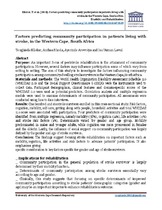Factors predicting community participation in patients living with stroke, in the Western Cape, South Africa
Date
2018Author
Elloker, Toughieda
Rhoda, Anthea
Arowoiya, Ayorinde
Lawal, Isa Usman
Metadata
Show full item recordAbstract
PURPOSE: An important focus of poststroke rehabilitation is the attainment of community participation. However, several factors may influence participation some of which vary from setting to setting. The aim of this study is to investigate the factors influencing community participation among community-dwelling stroke survivors in the Western Cape, South Africa.
MATERIALS AND METHODS: The World Health Organization Disability Assessment Schedule 2.0 (WHODAS 2.0) and the Social Support Questionnaire 6 (SSQ6) were the instruments used to collect data. Participant demographics, clinical features and domain-specific scores of the WHODAS 2.0 were used as potential predictors. Correlation analysis and multiple regression models were used to examine determinants of community participation. All assessments were conducted using face-to-face interviews.
RESULTS: One hundred and six stroke survivors enrolled in this cross-sectional study. Risk factors, cognition, mobility, self-care, getting along with people, household activities and total WHODAS 2.0 score were associated with participation. Four predictors of community participation were identified from multiple regression, namely mobility (38%), cognition (11%), life activities (4%) and stroke risk factors (1%). Determinants varied by gender and age group. Mobility predominated in males and younger adults, while cognition was more pronounced in females and the elderly. Lastly, the influence of social support on community participation was largely defined by the gender and age of stroke survivors.
CONCLUSION: The findings suggest focusing stroke rehabilitation on important factors such as mobility, cognition, life activities and risk factors to advance patients’ participation. It also emphasizes giving
specific consideration to key factors specific for gender and age of stroke survivors.

